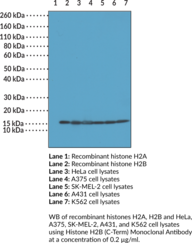Description
Histone H2B is a nuclear protein and a component of the nucleosome core, a basic unit of chromatin, that is essential for organizing genomic DNA in eukaryotic nuclei.{57056} It is a globular protein that contains a histone fold domain with a C-terminal α-helix that facilitates nucleosome interactions and chromatin compaction, as well as an unstructured N-terminal tail that extends outside of the nucleosome core, both of which are subject to various post-translational modifications (PTMs), including ubiquitination, acetylation, methylation, and phosphorylation.{57056,58056,58057} Histone H2B PTMs function as epigenetic regulators of gene transcription by affecting chromatin structure, influencing the interaction between transcriptional regulatory proteins with DNA, and regulating several cellular functions including gene expression, apoptosis, and DNA repair.{58056,58057,59041,59043} Increased tumor expression of HIST1H2BJ, the gene encoding wild-type histone H2B, is associated with prolonged overall survival and improved prognosis in patients with cervical cancer.{58058} Serum histone H2B autoantibodies have been found in patients with drug-induced or spontaneous systemic lupus erythematosus (SLE).{49096} Cayman’s Histone H2B (C-Term) Monoclonal Antibody can be used for ELISA, immunocytochemistry (ICC), multiplex-based assay, and Western blot (WB) applications. This antibody recognizes the C-terminus of histone H2B independent of PTMs.
Synonyms:
Immunogen: Peptide corresponding to the C-terminal region of human H2B
Formulation: 100 µg of Protein A affinity-purified monoclonal antibody
Isotype: IgG
Applications: ELISA, ICC, multiplex-based assays, and WB
Origin:
Stability: 365 days
Application|ELISA||Application|Immunocytochemistry||Application|Multiplex||Application|Western Blot||Product Type|Antibodies|Monoclonal Antibodies||Research Area|Epigenetics, Transcription, & Translation|Histones/Histone Peptides|Unmodified Histones||Research Area|Immunology & Inflammation|Autoimmunity|Lupus



